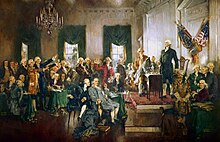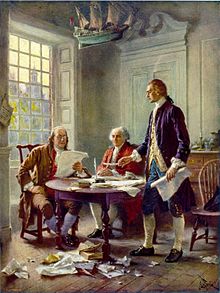Founding Fathers of the United States
The Founding Fathers of the United States are those individuals of the Thirteen Colonies in North America who led the American Revolution against the authority of the British Empire in word and deed and contributed to the establishment of the United States of America as a new, independent country.
A
[edit]- The general principles on which the fathers achieved independence, were the general principles of Christianity, in which all those sects were united, and the general principles of English and American liberty, in which all those young men united, and which had united all parties in America, in majorities sufficient to assert and maintain her independence. Now I will avow, that I then believed and now believe that those general principles of Christianity are as eternal and immutable as the existence and attributes of God; and that those principles of liberty are as unalterable as human nature and our terrestrial, mundane system.
- John Adams, Letter to Thomas Jefferson, 28 June 1813.
C
[edit]- What has suddenly happened is that the white race has lost its heroes. Worse, its heroes have been revealed as villains and its greatest heroes as the arch-villains. The new generations of whites, appalled by the sanguine and despicable record carved over the face of the globe by their race in the last five hundred years, are rejecting the panoply of white heroes, whose heroism consisted in erecting the inglorious edifice of colonialism and imperialism; heroes whose careers rested on a system of foreign and domestic exploitation, rooted in the myth of white supremacy and the manifest destiny of the white race.
- Eldridge Cleaver, Soul on Ice (1968), p. 90
- About the Declaration there is a finality that is exceedingly restful. It is often asserted that the world has made a great deal of progress since 1776, that we have had new thoughts and new experiences which have given us a great advance over the people of that day, and that we may therefore very well discard their conclusions for something more modern. But that reasoning can not be applied to this great charter. If all men are created equal, that is final. If they are endowed with inalienable rights, that is final. If governments derive their just powers from the consent of the governed, that is final. No advance, no progress can be made beyond these propositions. If anyone wishes to deny their truth or their soundness, the only direction in which he can proceed historically is not forward, but backward toward the time when there was no equality, no rights of the individual, no rule of the people. Those who wish to proceed in that direction can not lay claim to progress. They are reactionary. Their ideas are not more modern, but more ancient, than those of the Revolutionary fathers.
D
[edit]

- I am not wanting in respect for the fathers of this republic. The signers of the Declaration of Independence were brave men. They were great men too — great enough to give fame to a great age. It does not often happen to a nation to raise, at one time, such a number of truly great men...
I cannot contemplate their great deeds with less than admiration. They were statesmen, patriots and heroes, and for the good they did, and the principles they contended for, I will unite with you to honor their memory.
They loved their country better than their own private interests; and, though this is not the highest form of human excellence, all will concede that it is a rare virtue, and that when it is exhibited, it ought to command respect. He who will, intelligently, lay down his life for his country, is a man whom it is not in human nature to despise...
In their admiration of liberty, they lost sight of all other interests.
They were peace men; but they preferred revolution to peaceful submission to bondage. They were quiet men; but they did not shrink from agitating against oppression. They showed forbearance; but that they knew its limits. They believed in order; but not in the order of tyranny. With them, nothing was "settled" that was not right. With them, justice, liberty and humanity were "final;" not slavery and oppression. You may well cherish the memory of such men. They were great in their day and generation. Their solid manhood stands out the more as we contrast it with these degenerate times.
- Frederick Douglass, "What to the Slave is the Fourth of July?" (5 July 1852)
E
[edit]- [Thomas] Jefferson spoke for all the most prominent members of the revolutionary generation in urging posterity not to accept their political prescriptions as sacred script. It is richly ironic that one of the few original intentions they all shared was opposition to any judicial doctrine of " original intent." To be sure, they all wished to be remembered, but they did not want to be embalmed.
- Joseph J. Ellis, from his book, The Quartet: Orchestrating the Second American Revolution, 1783-1789 (2015), page 220. Alfred A. Knopf. ISBN 978-0-385-35340-3.
G
[edit]- We can not overestimate the fervent love of liberty, the intelligent courage, and the sum of common sense with which our fathers made the great experiment of self-government. When they found, after a short trial, that the confederacy of states, was too weak to meet the necessities of a vigorous and expanding republic, they boldly set it aside, and in its stead established a National Union, founded directly upon the will of the people, endowed with full power of self-preservation and ample authority for the accomplishment of its great object.
- James Garfield, inaugural address (4 March 1881)
- Our founders were insightful students of human nature. They feared the abuse of power because they understood that every human being has not only "better angels" in his nature, but also an innate vulnerability to temptation — especially the temptation to abuse power over others.
- Al Gore, Address at New York University (25 May 2004) Full text online.
H
[edit]- Ironically, the founders of the republic have been hailed and lionized by left, right, and center for—in effect—creating the first apartheid state.
- Gerald Horne, The Counter-Revolution of 1776: Slave Resistance and the Origins of the United States of America (New York University Press: 2014), p. 4
L
[edit]
- The achievements of women's rights movements, for instance, were real and important, but you cannot understand them if you do not first understand the founding fathers’ achievement in establishing a system of government based on the guarantee of rights.
- Mark Lilla, "The End of Identity Liberalism" (20 November 2016), The New York Times
- They were iron men, they fought for the principle that they were contending for; and we understood that by what they then did it has followed that the degree of prosperity that we now enjoy has come to us.
- Abraham Lincoln, speech (10 July 1858)
- Communities, by their representatives in old Independence Hall, said to the whole world of men: "We hold these truths to be self evident: that all men are created equal; that they are endowed by their Creator with certain unalienable rights; that among these are life, liberty and the pursuit of happiness." This was their majestic interpretation of the economy of the Universe. This was their lofty, and wise, and noble understanding of the justice of the Creator to His creatures. Yes, gentlemen, to all His creatures, to the whole great family of man. In their enlightened belief, nothing stamped with the Divine image and likeness was sent into the world to be trodden on, and degraded, and imbruted by its fellows. They grasped not only the whole race of man then living, but they reached forward and seized upon the farthest posterity. They erected a beacon to guide their children and their children's children, and the countless myriads who should inhabit the earth in other ages. Wise statesmen as they were, they knew the tendency of prosperity to breed tyrants, and so they established these great self-evident truths, that when in the distant future some man, some faction, some interest, should set up the doctrine that none but rich men, or none but white men, were entitled to life, liberty and the pursuit of happiness, their posterity might look up again to the Declaration of Independence and take courage to renew the battle which their fathers began, so that truth, and justice, and mercy, and all the humane and Christian virtues might not be extinguished.
- Abraham Lincoln, speech at Lewistown, Illinois (17 August 1858)
- Four score and seven years ago our fathers brought forth on this continent, a new nation, conceived in Liberty, and dedicated to the proposition that all men are created equal.
- Abraham Lincoln, The Gettysburg Address, honoring U.S. soldiers at the dedication of the Soldiers National Cemetery at Gettysburg (19 November 1863), based on the signed "Bliss Copy"
P
[edit]- Being good gentlemen of the Enlightenment, the Founders thought that the demise of slavery would come about naturally. Washington, John Adams, Thomas Jefferson, all believed that somehow slavery would disappear.
- Robert Parks, "Hoping Someone (Else) Would Abolish Slavery" (24 February 1994), by Herbert Mitgang, The New York Times
R
[edit]- The American experiment in democracy rests on this insight. Its discovery was the great triumph of our Founding Fathers, voiced by William Penn when he said: “If we will not be governed by God, we must be governed by tyrants.” Explaining the inalienable rights of men, Jefferson said, “The God who gave us life, gave us liberty at the same time.” And it was George Washington who said that “of all the dispositions and habits which lead to political prosperity, religion and morality are indispensable supports.” And finally, that shrewdest of all observers of American democracy, Alexis de Tocqueville, put it eloquently after he had gone on a search for the secret of America’s greatness and genius—and he said: “Not until I went into the churches of America and heard her pulpits aflame with righteousness did I understand the greatness and the genius of America. America is good. And if America ever ceases to be good, America will cease to be great.” Well, I’m pleased to be here today with you who are keeping America great by keeping her good. Only through your work and prayers and those of millions of others can we hope to survive this perilous century and keep alive this experiment in liberty, this last, best hope of man.
- Ronald Reagan, "Evil Empire" speech (1983)
T
[edit]- The patriots who built our country were not villains, they were heroes whose courageous deeds improved the Earth beyond measure. The beauty and the glory of our constitutional system is that it gives us the tools to fight injustice, to heal division, and to continue the work of our Founding Fathers by expanding and growing the blessings of America. If you believe in justice, if you believe in freedom, if you believe in peace, then you must cherish the principles of our founding and the text of our Constitution. It is our founding and our Constitution. It is a firm foundation upon which all progress is achieved. That’s why our country is so strong, even despite terrible things that happen over the generations.
- Donald Trump, 4th of July Speech, (2020)
W
[edit]- All the leading Founders affirmed on many occasions that blacks are created equal to whites and that slavery is wrong.
- Thomas G. West, Vindicating the Founders (1999), p. 4
See also
[edit]External links
[edit] Encyclopedic article on Founding Fathers of the United States on Wikipedia
Encyclopedic article on Founding Fathers of the United States on Wikipedia
